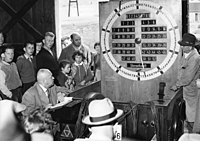
Photo from wikipedia
When agents (bidders) have multi-demand preferences, uniform price auctions are generally not immune to agents’ strategic manipulation, and they may achieve an inefficient allocation. We consider economies in which a… Click to show full abstract
When agents (bidders) have multi-demand preferences, uniform price auctions are generally not immune to agents’ strategic manipulation, and they may achieve an inefficient allocation. We consider economies in which a large number of identical objects have to be allocated. Agents have quasi-linear preferences with non-increasing incremental valuations. We explore the incentives of agents in uniform price auctions. An important assumption on preferences is proposed, called “no monopoly.” It requires that preferences should be correlated in such a way that no agent’s incremental valuation for an additional object when he receives sufficiently many objects is higher than those of the other agents. We show that under no monopoly and other mild assumptions on preferences, as the number of objects goes to infinity, the payment in any uniform price auction converges to that in a Vickrey auction. We deduce that when there are sufficiently many objects, truth-telling is an approximate Bayesian Nash equilibrium in each uniform price auction.
Journal Title: International Journal of Game Theory
Year Published: 2019
Link to full text (if available)
Share on Social Media: Sign Up to like & get
recommendations!